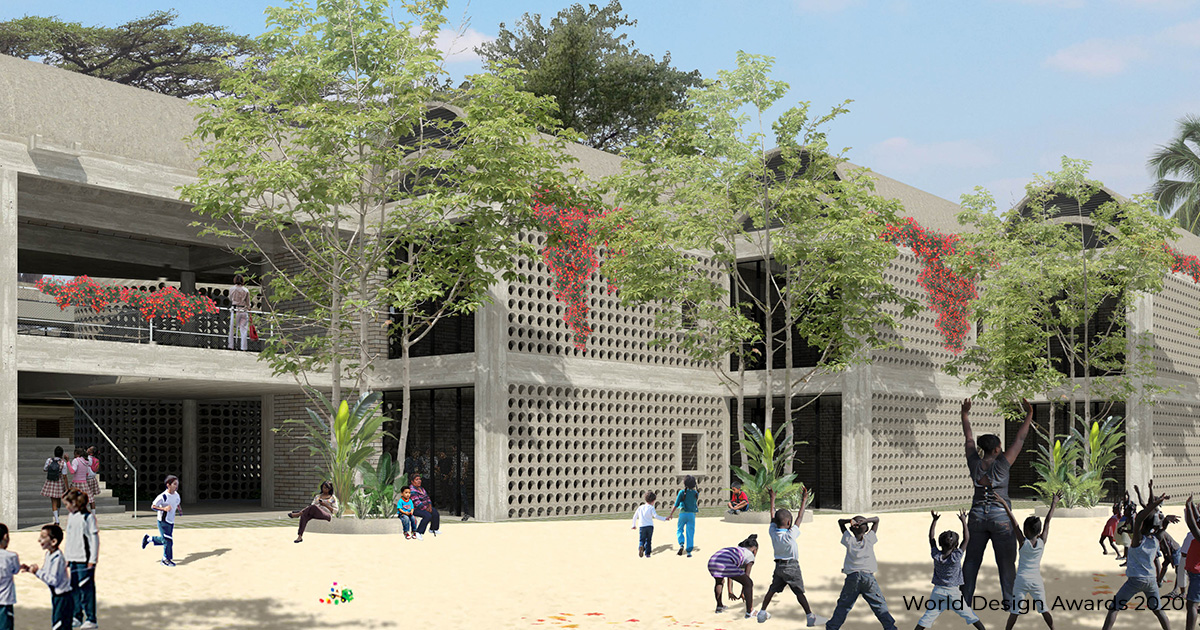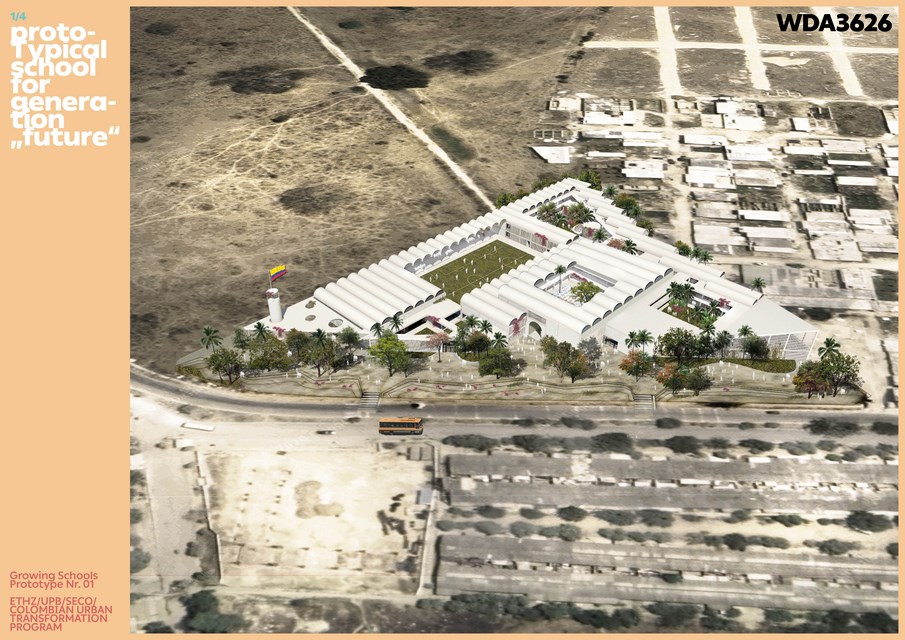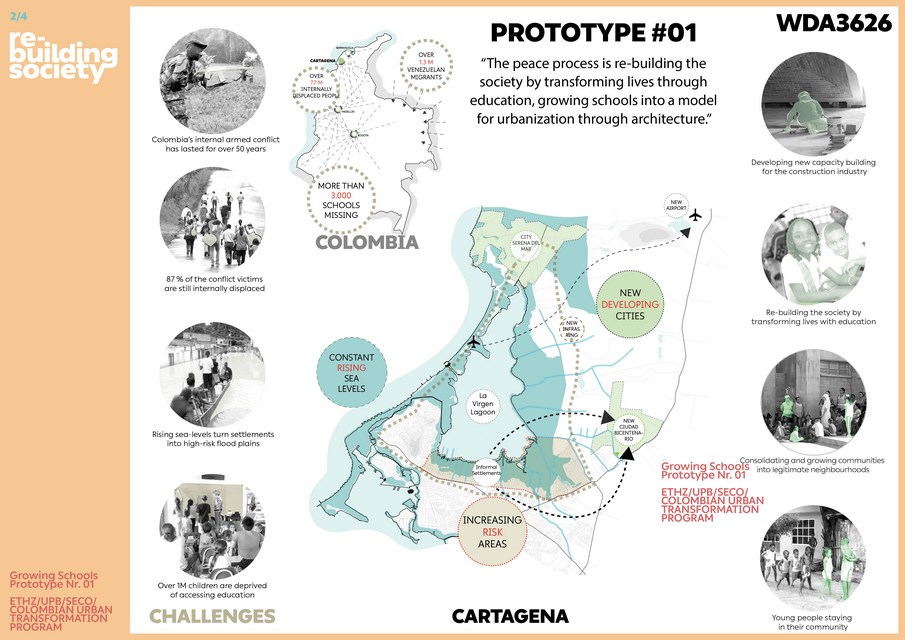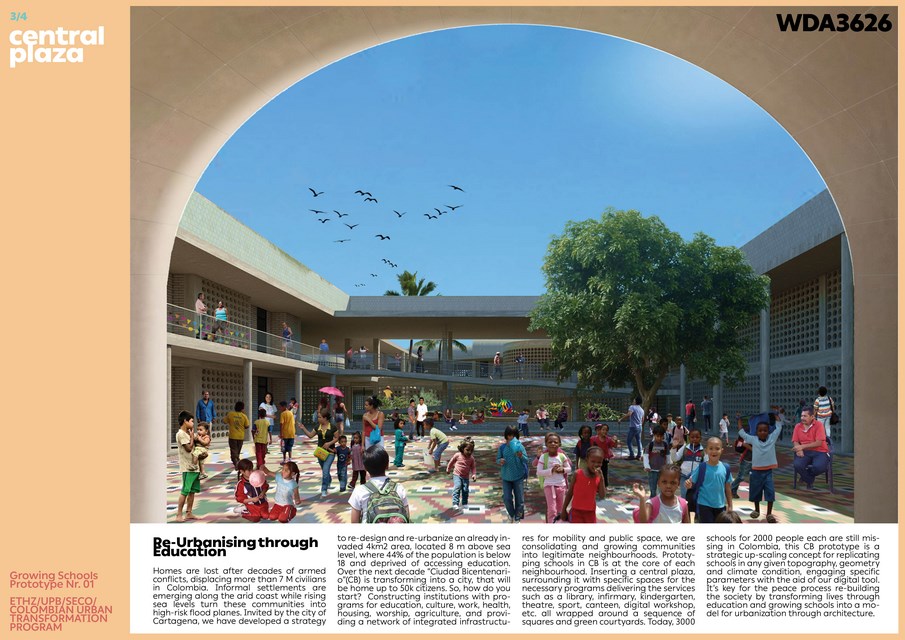Growing Schools Prototype by ETH/UPB/SECO/Colombian Urban Transformation Program | World Design Awards 2020
ETH/UPB/SECO/Colombian Urban Transformation Program: Second Award of World Design Awards 2020. Homes are lost after decades of armed conflicts, displacing more than 7 M civilians in Colombia. Informal settlements are emerging along the arid coast while rising sea levels turn these communities into high-risk flood planes. Invited by the city of Cartagena, we have developed a strategy to re-design and re-urbanize an already invaded 4km2 area, located 8 m above sea level, where 44% of the population is below 18 and deprived of accessing education. Over the next decade “Ciudad Bicentenario”(CB) is transforming into a city, that will be home up to 50k citizens. So, how do you start? Constructing institutions with programs for education, culture, work, health, housing, worship, agriculture, and providing a network of integrated infrastructures for mobility and public space, we are consolidating and growing communities into legitimate neighbourhoods. Prototyping schools in CB is at the core of each neighbourhood. Inserting a central plaza, surrounding it with specific spaces for the necessary programs delivering the services such as a library, infirmary, kindergarten, theatre, sport, canteen, digital workshop, etc. all wrapped around a sequence of squares and green courtyards. Today, 3000 schools for 2000 people each are still missing in Colombia, this CB prototype is a strategic up-scaling concept for replicating schools in any given topography, geometry and climate condition, engaging specific parameters with the aid of our digital tool. It’s key for the peace process re-building the society by transforming lives through education and growing schools into a model for urbanization through architecture.
Social /translating peace into neighbourhoods
After 50 years of armed conflict, informal neighborhoods settling in risk zones has prevailed. It is key to translate the peace process into a physical process of reconstruction and integration. Many of the 7M Colombians, and 1,4M refugees from neighboring Venezuela are arriving at the coast where development is possible but innovation like the Maker Space inside the school as a C4IR is still needed to provide positive perspectives of education for all age groups. Especially the high number of children and youth need urgently anchors a perspective and role models to thrive. Foundations Pies Descalzos and Mario Santo Domingo have partnered with civil society and the City to provide such a model of empowerment, legitimate long-term presence to maintain and operate the schools and community services over an extended period of time with a compromise to for education, leave nobody behind and stay as long as necessary and needed.
Environmental / ecologic urbanisation
Latin America and the Caribbean are one of the most urbanized regions in the world. Cartagena the city with the highest income differences, next to modern high-rise beach-resorts, we find informal settlements built by the poorest families on illegal landfills adding additional risks. By deforesting mangrove forests around the La Virgen lagoon, negative effects of rising sea levels are destroying entire communities along an increasingly uncontrolled flood plane. Repetitive re-building efforts on the waters edge and further loss of the mangrove belts flora and fauna is not an option. We are re-imagining Cartagena instead of a city along the coast, as ecologic urbanization around the lagoon.
This re-imagination of the city as an infrastructure ring providing a series of trans-scalar interventions. Ranging from tactical educational up-grade projects like this school to potentially large scale strategies such as the re-location of the inner-city airport. In the effort to reconstruct and recuperate the lagoon and design radial water canals stretching deep into the surrounding urbanizing landscape.
Governmental / leave no one behind
Changing governments, corruption, clientelism and the lack of continuity are characterizing the risks of administrating Cartagena. Several Mayors during a single mandate and decisions taken contrary to the democratic processes have been the rule. Alternative partnerships between local foundations and private enterprises, with some of the most excluded social strata in Colombian civil society, have provided an alternative paradigm. Recommendations accompanied by the execution of concrete short and long-term actions are improving the live conditions of the sectors 1 and 2 in Cartagena. A local stakeholder network designed to build an alternative governance structure, setting goals and align forces and resources, to achieve concrete goals. Today’s framework is a legitimate partnership of local, federal and bi-lateral agents, accepting responsibilities and strengthening the governing bodies. This is creating common ground for accountability for the next generation of citizens.

Firm: ETH/UPB/SECO/Colombian Urban Transformation Program
Architects: Diego Ceresuela-Wiesmann, Hubert Klumpner, Alejandro Restrepo, Blanca Garcia-Gardelegui
Category: Cultural Concept
Project Location: 2nd Phase Development: Sebastián Ramirez (Coordinator UPB), Pablo Levine, Alejandro Jaramillo, Ana María Mejía, Daniel Zuluaga, Juan Pablo Zuleta, Lucas Lerchs, Manuela Henao, Nick Daeschler, Santiago Molina, Sara Monsalve, Simón Saldarriaga 1st Phase Development: Sebastián Mejía, David Cuartas, Edgar Mazo, Farid Maya, Lina Durango Consultants: Alfredo Madrigal, Andrés Steiner, Claudia Silva, Elisabeth Parra, Juan Camilo Isaza, Julio Miguel Silva, Nicolás Hermelín, Ruedi Baur, Thomas Auer
With support of: State Secretariat For Economic Affairs (SECO) / Swiss Government; Municipality of Cartagena; Ministry of Education/ FFIE; Fundación Pies Descalzos (FPD); Fundación Mario Santo Domingo (FMSD); Financial Institution for Development (FINDETER)
Country: Colombia
Photography ©Credit: ETH/UPB/SECO/Colombian Urban Transformation Program
![]() The “Colombia Urban Transformation Program” (CUTP) provides an opportunity to promote sustainable urban transformation and economic development in Colombian cities and vulnerable communities. By combining, teaching with researching and the active making of projects, this program is developing carefully crafted pilot projects and integrated infrastructures, contributing to the improvement of a greater quality of life of hundreds of people. This program is a collaboration between the Swiss Federal Institute of Technology Zurich ETHZ / D-Arch Klumpner Chair of Architecture and Urban Design, the Universidad Pontificia Bolivariana (UPB) and other local partners, supported by the Swiss State Secretariat for Economic Affairs (SECO).
The “Colombia Urban Transformation Program” (CUTP) provides an opportunity to promote sustainable urban transformation and economic development in Colombian cities and vulnerable communities. By combining, teaching with researching and the active making of projects, this program is developing carefully crafted pilot projects and integrated infrastructures, contributing to the improvement of a greater quality of life of hundreds of people. This program is a collaboration between the Swiss Federal Institute of Technology Zurich ETHZ / D-Arch Klumpner Chair of Architecture and Urban Design, the Universidad Pontificia Bolivariana (UPB) and other local partners, supported by the Swiss State Secretariat for Economic Affairs (SECO).







